‘It Chose Me’: One Self Taught Artist to the World | London, UK
EAS artist and writer Uji Venkat in conversation with artist Sharon Adebisi.
(click on images to enlarge)
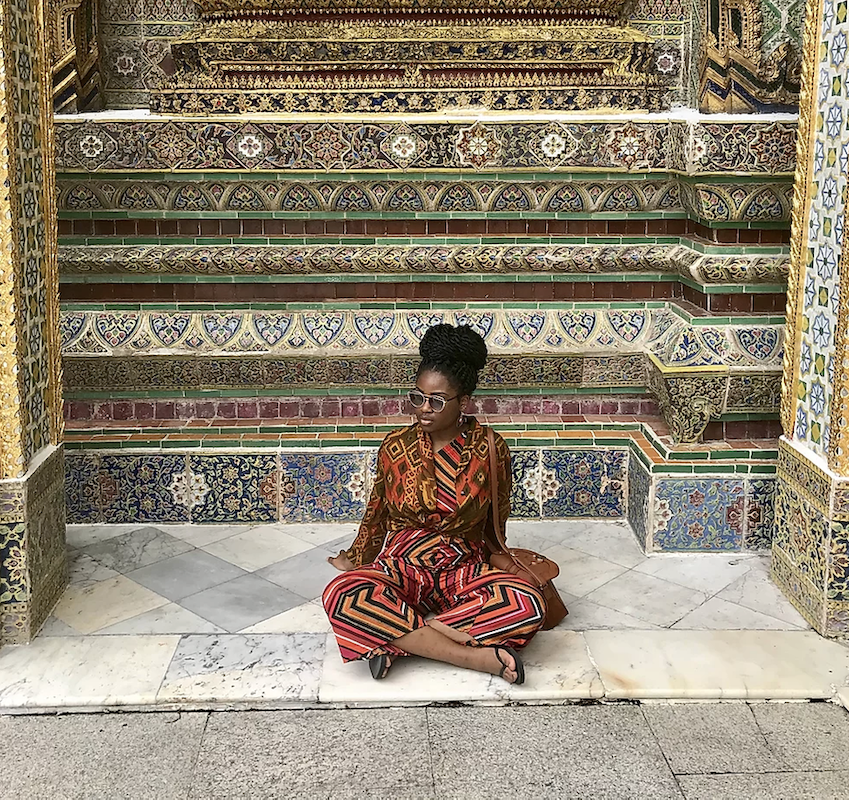
Sharon is a self-taught painter based in London, England. Her work was chosen to be a part of Emergent Art Space’s Calling Across the Distance online exhibition in June. After following in her parents footsteps and earning a degree in the biological sciences, she volunteered in a rural village in Cambodia for 3 months. She discovered the significance of art and its use as a communication tool within society. Since then, Sharon's art has been a reflection of her mind. As she travels through her twenties, she aims to create a visual journal of this self discovery through contemporary portraiture.
She recently traveled to Ghana, to understand the roots of her heritage. Her trip inspired her current series. She explores her identity in layers as a black British woman. Sharon inherently identifies as born black, next with her Nigerian culture, and lastly, British.
Tell me about when you realized you wanted to be an artist.
I don’t think I ever really chose to be an artist, it chose me. It started off with me just enjoying drawing and using it to entertain myself when I was a kid. Then as I grew older, I’d use my drawing and painting skills to create inexpensive birthday gifts for my friends (to appease my bank account!).
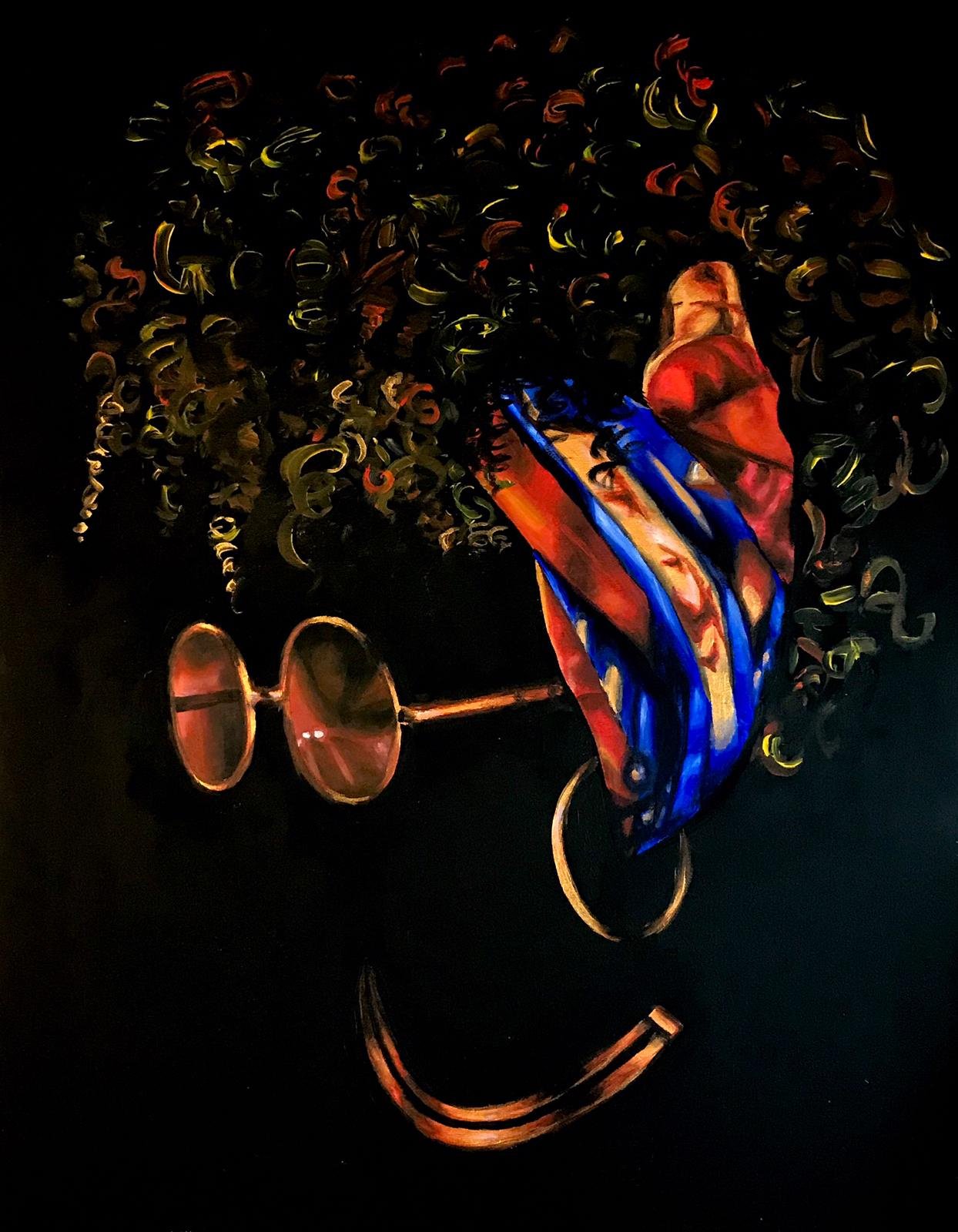
Over time, more people started to notice the work I was doing for friends and would ask me to paint stuff for them for a fee. I did this for a few years, especially during university to help me financially through my degree. People started calling me an artist, and I guess I just started to own it! It was during university that I then decided to create my art brand ARTBYADEBISI.
As a self-taught artist, how did you learn and hone your skills as an artist?
Academically, I didn’t take art at a level any higher than sixth form (high school) because whilst I liked doing it for fun, it didn’t really feel like a passion at the time. Secondary school and sixth form taught me the basics in terms of colours, shading, and sketching, but the rest of my skills were learned from practise and visiting art galleries. The more works of art I observed, the more inspired I felt to create; and the more I created, the better I became.
How did this lead to the development of your work?
Visiting different art galleries and exhibitions and seeing a variety of weird and wacky artwork made me see the beauty in abstract pieces, which steered me away from creating traditional art, to more unconventional pieces. I now create paintings of people without faces, landscapes that lack depth and dimensions and I use unrealistic colours to portray realistic objects. And I love the result!
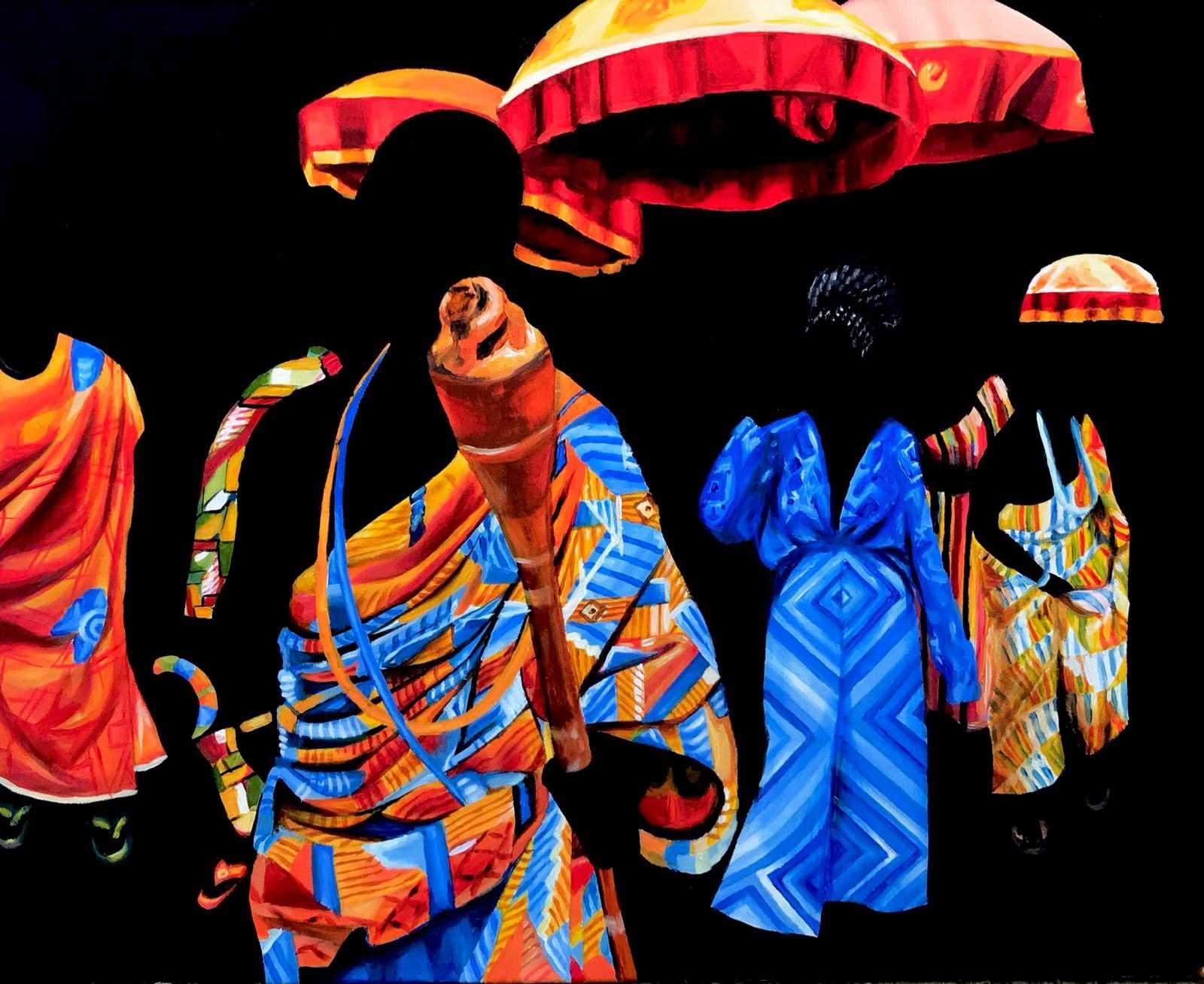
What challenges did you encounter in your art and how did you overcome them?
In the beginning stages of establishing my art business, painting started to feel like a chore and just a business transaction. Due to demands from commissions, I never had enough time or energy to create pieces for myself. I wasn’t enjoying it anymore. In fact, I started to detest it. To overcome this feeling, I decided to stop doing commissions altogether.
Around the same time, I graduated from university. Leaving the bubble of full-time education and joining the adult workforce was an emotional rollercoaster. I found myself leaning towards painting to visually journal my barrage of thoughts and experiences. Using art to self-reflect and process the changes around me led me to fall in love with it again. And now, due to stopping commissions and only creating from the heart, my art has gained recognition globally, been exhibited, sold, and shortlisted in competitions of all sorts! I definitely believe I made the right decision.
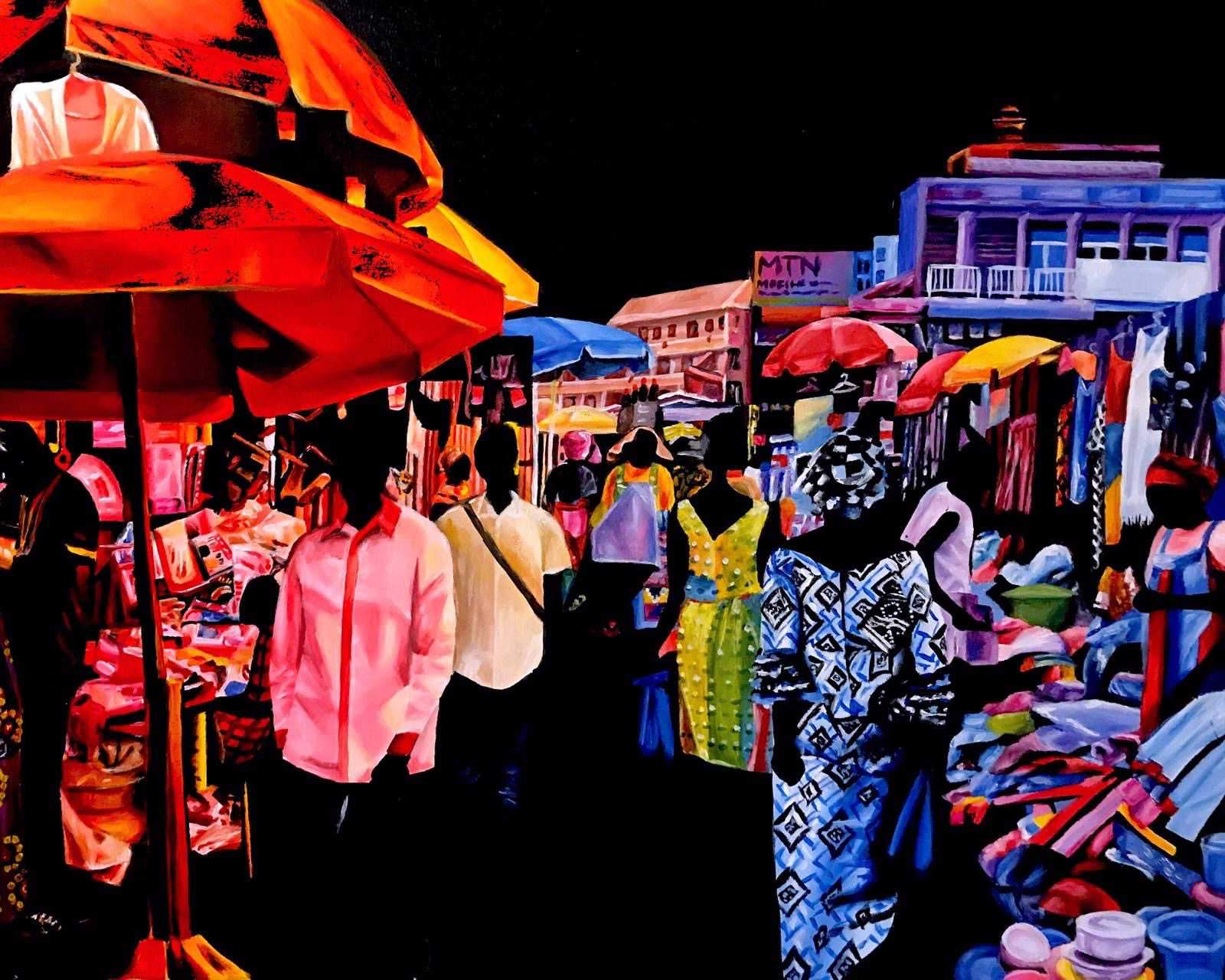
What are you working on now?
I am currently expanding my Ghana series; a series of paintings based on my experience traveling to Africa for the first time earlier this year. This series explores the realities of being a British-African hybrid with an uncertainty of where to label as ‘home’ and narrates the emotions I felt at different stages of my trip to Ghana.
It starts off with 'The Foreigner' where before I departed, I portray my initial reservations about how I felt like I was going to be treated upon arrival to Ghana.
'The Overwhelmed Foreigner' with its immense colours and flurry of activity depicts how I felt after I arrived, especially when I visited a market in the city of Kumasi.
'The Acclimatised Foreigner' is one of the final paintings in the series, where after being in Ghana for over 2 weeks, I was starting to feel a lot more at home.

Can you tell me about your choice to not paint facial features in the Ghana series? I love that the defining features are ones that we have choice over: hairstyle, clothing, posture, color, surroundings.
So about a year ago, when I was facing some challenging times, being rejected from medical school for the 12th time, I lost a sense of my identity. I no longer felt like I knew who I really was and would portray this in my art by painting blurred out, faceless portraits. In my solitude, I started reading books by black authors such as Chimamanda Ngozie Adichie, Yaa Gyasi and Imbolo Mbue, and began to learn a lot more about what it means to be black. My identity was slowly restored the more books from black authors I read, and I started to feel more confident in who I was as a black woman. Reading these books moved me from a state of an identity crisis, to being certain of one thing--my blackness, and I began to portray that certainty in my art by painting portraits with pure black faces and skin. My choice to not paint any other facial features and keep just the faces black stems from the fact that I am still trying to figure out who I am, but for now, the one thing I’m sure of about myself is my blackness.
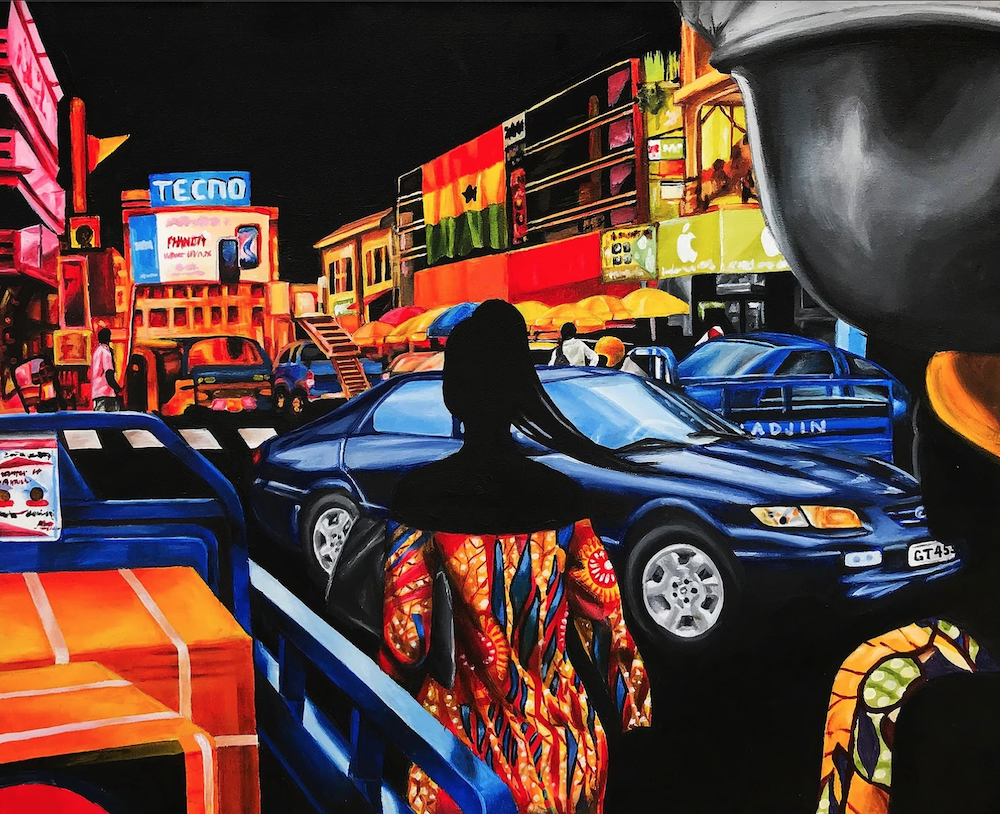
In what direction would you like to expand your work?
Whilst I still want to maintain my current style, with saturated colours and negative space, I want to experiment with different materials, such as gold leaf, and work on different bases, like glass or wood. I also want to make my work more educational. I want to use my art as a tool to teach people about black history and culture within Africa, Britain and other parts of the world.
As an artist, do you work with other media beyond paint?
I only work professionally with paint for the time being, as I find it to be my strongest way to visually articulate emotions I have felt. I do dabble with photography when I travel, but it’s more to just capture aesthetically pleasing sights. I only feel comfortable labelling my work as ‘art’ when it captures my emotions and mind frames, which my photography lacks.
What initiated your trip to Ghana earlier this year?
I travelled to Ghana to undertake a medical work placement there. Aside from art, I am interested in science and medicine, with my first degree in Physiology and Pharmacology, and my upcoming degree in Medicine. I chose Ghana specifically for this work placement because I wanted to learn more about the culture, especially of the Asante people and visit the Cape Coast to learn more about the transatlantic slave trade, directly from one of its sources.
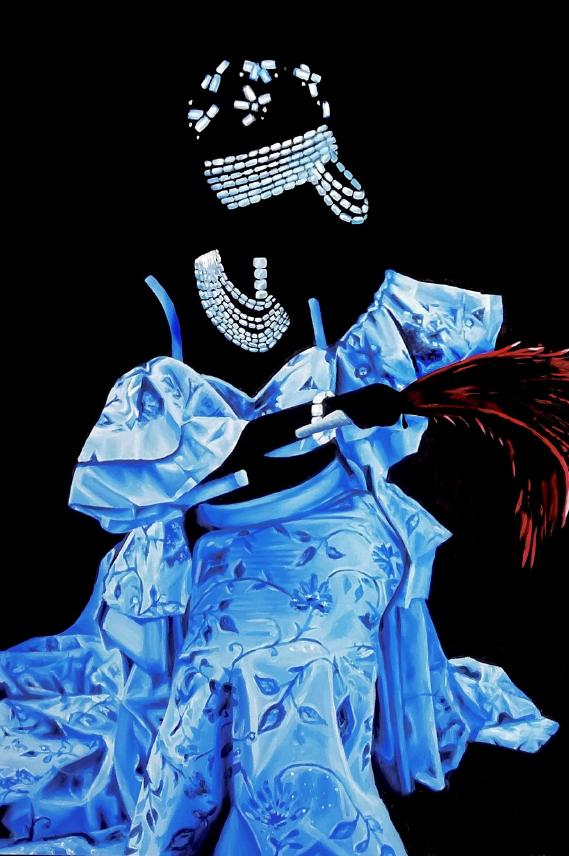
Your art and travel diaries express an awareness that we are living in a global, interconnected world. How has this impacted your work as an artist?
In 2017, I volunteered for a few months in Cambodia to help boost youth employability. During my time there, I lived with the loveliest Cambodian host family. But there was one problem. We couldn’t understand each other. I only knew tiny scraps of Khmer, whilst they knew virtually no English. So being unable to verbally communicate due to the language barrier, I would instead use drawings to engage with them. During my time there, I created art purely for communicative purposes and it felt sooo good doing so. This fulfilling experience definitely played a part in my decision to start only creating artworks that express my mind.
Sometimes art can reach places in communication that words can’t. Even though we are in such an interconnected society, especially with tools such as social media, differences in our languages still pose a huge barrier in our connection. But at times, art can overcome this.
What advice do you have for young artists around the world?
Never compare your art journey to someone else’s. Just focus on yourself and invest time, money (yes, money! your skill is worth it), energy and consistency into your craft. In due time, you will see results.